

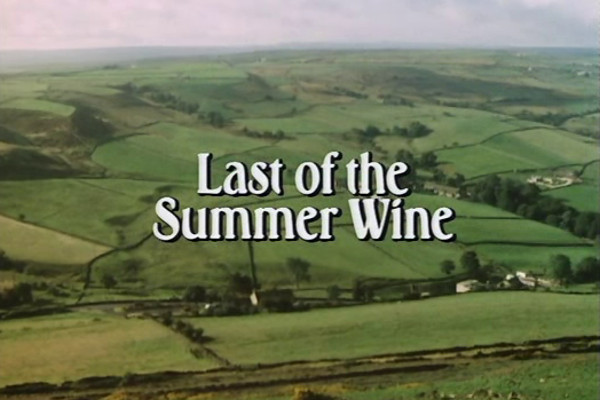
The DVD of the series can be ordered online from Amazon. In the meantime, please join me as I rank the episodes from worst to best...

Brian Wilde reportedly had to be talked into appearing in series eight, as he didn't think the scripts were of a high enough standard. It's a strange take, as Roy Clarke's muse seems to be really back for much of the run, giving Foggy philosophical insights like "I don't care for this passive, Buddhist attitude. It sits very uncomfortably on the shoulders of a Christian fighting man" and the almost surreal "Just drink your tea, will you? Try not to sound like someone being brutal to an orange." Wilde's immense skill makes the most out of these and many other great lines he's given in the run.
Sadly, those great lines occur in other episodes. While this one certainly has its moments and isn't as big a low as some previous years, it is pretty much a one-joke plot: after seeing some scrambler bikes, Foggy decides that Compo should be a masked rider to entice Nora Batty. The sole motivation for this appears to be simply because they're characters in a sitcom, and that's what sitcom characters do. It also gives stuntman Stuart Fell a lot of work as he rides around in a helmet as "Compo", Bill Owen's post-dub voice not even muffled to help the illusion along.
It's weak stuff, no doubt, with a very flat ending, but thankfully the rest of the run was of a better quality...
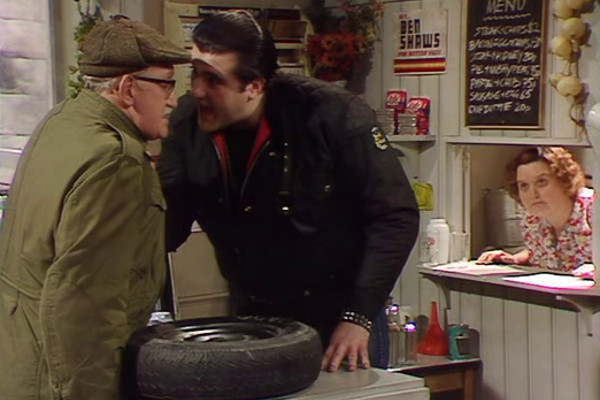
A stage play based on the series began in the early 80s, at one point featuring Jonathan Linsley as a somewhat threatening character, "Crusher". After John Comer died in 1984, it was decided to bring "Crusher" into the series as Ivy's nephew, albeit reworked as a far more docile and less menacing character.
Linsley himself admitted that the show had become much broader and moved towards farce since its early days, and the character he plays is that "too dumb to be believable" archetype that you often find in sitcoms. Linsley does have a kind of affable charm and chemistry with Bill Owen that makes it just about work, though the character isn't a high point.
Crusher is first introduced in this episode (along with another not-quite-believable eccentric character, played by Brian Glover), but this does cause continuity issues with The Loxley Lozenge. Clearly filmed later, or at least intended to air later, The Loxley Lozenge was brought forward as a non-seasonal "Christmas special", and does feature a brief scene involving Crusher. This means that the trio meet Crusher before he's actually introduced to them two episodes later.
Some repeats removed this scene (and Linsley's credit), but most surprising of all is that it was removed from the DVD, rather than simply presenting the episodes in the order in which they were originally intended.
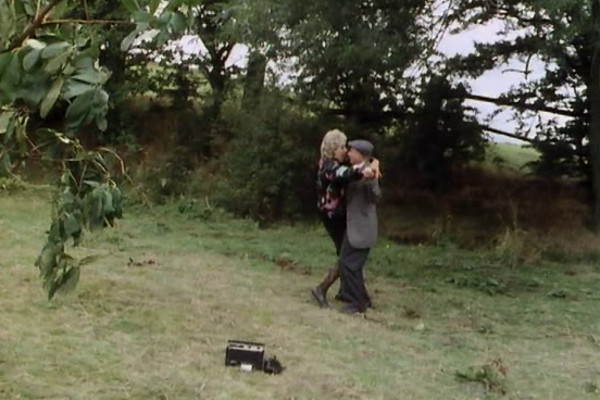
Three more characters from the stage play are introduced into the series here - Howard, his wife Pearl, and Marina, the woman he attempts to have an extra-marital affair with. It might seem like overload to introduce three new characters at once (even if they are all interrelated), but the strangest part is all the regulars talking about them as if they've been in the show for years.
Their shaky, non-existent backstory - which appears to refer to events of the stage play in parts - is fine, and we've met characters in the show before that the regulars know that we, as viewers, don't. But as they're so entrenched in the regular lives of the usual characters - even cafe customers who know Nora and Ivy well - it's hard to shake the feeling of "then why haven't we seen them before?"
Adding to the cast in this episode is the titular Digby, whose donkey is, thankfully, just a backdrop to a more dialogue-based episode, the use of obvious stunt doubles just a brief distraction. Also in there is David Hatton as a pub drunk, who gives a very "big" performance, which may or may not work, depending on point of view.
Last of the Summer Wine did become a pretty poor series towards the end of its run, mercifully ended by the BBC. As Howard, Pearl and Marina all stayed with the programme until the very end, clocking up over 200 episodes each, it's easy to look back on this as some kind of line between the "trio" and "ensemble" years. However, it's not quite as cut and dried as that: while they do get scenes to themselves, as this stage it still seems if they're guests in the show of Clegg, Compo and Foggy. They may seem like a harbinger of the weaker years to come, but we're not quite there... at least not yet.
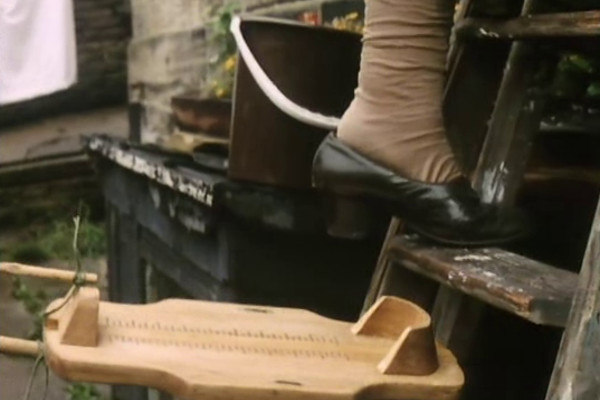
One element not really previously covered in these articles are the viewing figures that Last of the Summer Wine received. There's a brief mention of things like Forked Lightning from series two reportedly getting "over 18 million viewers", but this has yet to be substantiated. What is known is that JICTAR had the same episode listed as 7.5m. JICTAR was the ITV version of audience measurement, which recorded how many homes watched an episode, not how many people. Consequently the JICTAR rating isn't really convertable to the old BBC ratings, but would probably work out to be around 15 million.
Regardless, JICTAR had Forked Lightning ranked joint 9th in the most-watched programmes that week, which may give more of an indication. And while the programme had some success throughout its first four series - a repeat of Who Made a Bit of a Splash in Wales Then? in July 1979 made 11th place - it generally wasn't until series five that it became "big".
It's perhaps not a coincidence that the first six episodes of series five - averaging at over 21 million viewers on the BBC ratings system, and averaging in fifth place - occurred during the three-month ITV strike. The first episode of a two-parter, Here We Go Into The Wild Blue Yonder, almost reached the top, taking second place with 19.55m viewers... the second part, broadcast when ITV came back on air, dropped to 13.05m and 17th place.
Ironically for a channel that was then already pretty infamous for summer repeats, it was a repeat that saw the programme hit the top spot for the very first time - a July 1980 showing of Deep in the Heart of Yorkshire, along with an August 1980 repeat of, again, Who Made a Bit of a Splash in Wales Then?.
Discovering historical ratings isn't easy for a lesser-explored series like this one, and searching through old newspapers and the like doesn't always turn up results. By the 1980s both JICTAR and the BBC's own system were gone, replaced by BARB, though ratings for series six aren't available. What can be found is that series seven was a consistent top 5 programme, except for The Three Astaires, which ranked sixth among BBC programmes with 11.35m viewers, but was beaten by ITV in the charts.
Getting Sam Home was another No.1 for the series, and the first time a brand new episode managed the feat. Which, following more decently-received repeats, brings us up to series 8. All ratings are available for this run, save for The Woollenmills Of Your Mind, and all other episodes were in the top 5 that week. (The "Christmas Special" of The Loxley Lozenge made 11th place with 15.25m viewers).
Overall, the episodes of series 8 for where figures are available averaged at just over 17 million viewers, and just under 3rd place in the chart. The series was immediately followed by repeats of series 6 (which again did well), followed by 14.4m for a repeat of The Loxley Lozenge, which beat its previous outing in chart placement, getting to 8th place.
If you're a historical TV ratings geek, you'll hopefully enjoy this information. If you're not, you'll wonder when all this stat-based rambling will ever end. It ends here, with the revelation that The Mysterious Feet Of Nora Batty was the highest-rated episode of series eight. It got to 2nd position on the chart (as did Catching Digby's Donkey, with 16.75m tuning in) and scored a first-night viewership of 18.8 million.
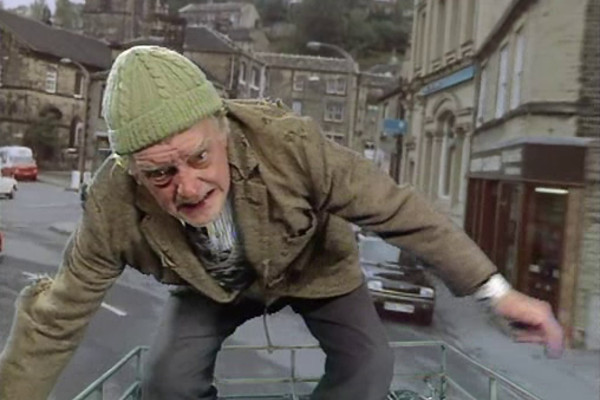
It's easy to look down on Alan Bell's time as director and producer of Last of the Summer Wine, given that it oversaw the long decline and eventual cancellation of the show. However, the final end of the programme was still 25 years in the future, and overlook what Bell brought to the series in terms of filmic content.
It takes a brave sitcom to open with a long conversation about an unknown character from the past ("Charlie Parblow"), and even braver to have two of the three people involved having their backs turned to the camera. There's lots of special moments in this episode, such as Foggy speculating on how he'd "soon put a stop to this 'solo harp' lark" if he got to Heaven, or a clear sign that the show is now geared towards families, whereby the activities of Vikings are described via spoonerism ("laping and rooting") and not, as it would have been in the early years, stated outright.
It ends with two unusual sequences that reveal "the magician's tricks", as it were. One is that any stunt sequence involving Compo is only too obviously stuntman Stuart Fell dressed up, but here they clearly felt that something else was needed to help the illusion along, so shots are inserted of Bill Owen in front of blue screen, supposedly on the top of a speeding range rover. The other is that he sees Nora Batty getting undressed, and Kathy Staff's bra padding to play the larger Nora is clearly on show.
Brian Wilde was open about his dislike of Bell's time-consuming practises, and this was one of the contributing factors in him deciding to leave the programme after this series. The two actually reconciled in 1988, when Bell was also producer/director on the sitcom Wyatt's Watchdogs, which starred Wilde along with Trevor Bannister.
While an Anorak Zone article on Wyatt's Watchdogs was considered, it would involve changing the title of this format to a "Worst To Worst" article, as it's generally one of the most terrible sitcoms I've ever seen, a misfiring "comedy" so bad that even Wilde's huge skill is left to flounder. There's an argument to be made that Wilde's more underplayed, reactive acting style would have needed to be "bigger" to carry a series as the central character, but this wasn't the only problem with a fundamentally misconceived programme.
However, Wyatt's Watchdogs did, in an indirect way, provide laughs, as the improved relationship between Bell and Wilde led Foggy to return in 1990. However, for now, this was his final episode, though the character's leaving wouldn't be revealed until the following year...
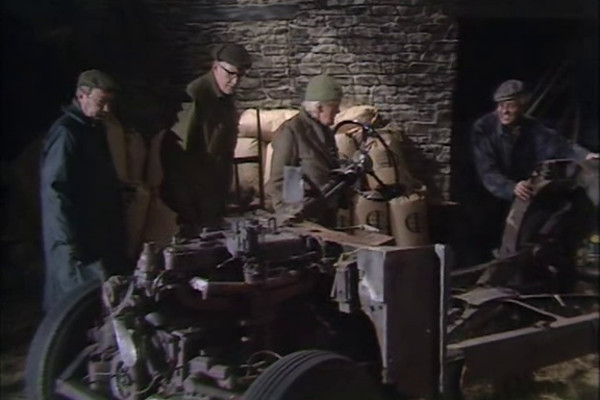
As discussed with Keeping Britain Tidy, this was apparently shot and scheduled to be just another episode of the series, but was brought forward to air the year before, going out on the 30th December 1984.
There's signs of the "ensemble" format to come, as Nora and Wally Batty get their own scenes, independent from the regulars, though these are very welcome due to Joe Gladwyn's terrific timing. Also brought back into the mix is Gordon Wharmby as Wesley, a car enthusiast with very little luck.
There's nothing that's particularly outstanding in this instalment, at least on the surface. It's just a solid, well-constructed episode. However, what makes it rank so high is the great work of the cast, delivering each line to their best capabilities, and with Wilde, particularly, giving no indication that he was a man tired of the programme and wanting to move on.
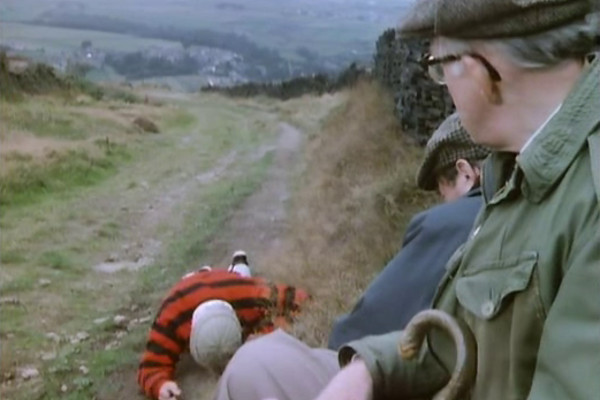
On the face of it, The Woollenmills of your Mind is pretty much Summer Wine 101, where Compo is roped into doing something outrageous to impress Nora Batty, just two episodes after the last time he did it. However, this week's activity - jogging - merely acts as a backdrop to a more wistful, reflective episode that shows Roy Clarke at his best.
There's Compo's reflection on a girl who he met "building a wall" who went to work on an oil rig... character-based dialogue that's worth a dozen "Nora Batty's stockings" routines. This said, Compo's feelings for Nora have a purity to them this time around, and there is a certain poignancy to his intentions. Then there's a more melancholic tone as Compo ruminates on Marilyn Monroe: "I couldn't get over what a, what a terrible shame it was that, that attractive lass... had to die, thinking... nobody cared." It's a moment of pure reflection perhaps not seen since Clegg's musing in the first series that "You don't get a lot of time given for being 19".
Although this is 1985, Compo can still talk about a "coloured bird" with no real shock value. However, while this might seem slightly jarring when watched in 2020, it's nothing compared to the Only Fools and Horses episode Hole In One which aired three days earlier, with not one but three mentions of a "P***" who owns the local cafe.
There are those who like Last of the Summer Wine for the more outrageous, stunt-based routines and easy stereotypes of henpecked husbands and nagging harridans, but for a gentler, more reflective episode, this one is something of a stand out.